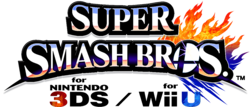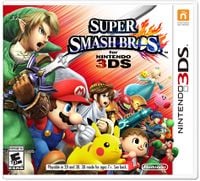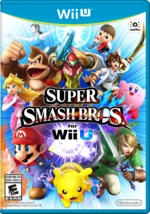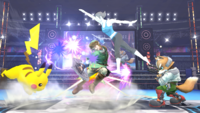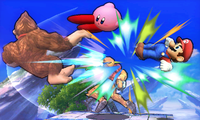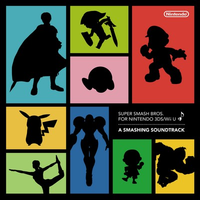Super Smash Bros. for Nintendo 3DS / Wii U
This article is under construction. Therefore, please excuse its informal appearance while it is being worked on. We hope to have it completed as soon as possible.
Super Smash Bros. for Nintendo 3DS and Super Smash Bros. for Wii U are the fourth and fifth installments of the Super Smash Bros. series respectively[1], and were developed by Sora Ltd. and Bandai Namco Games.[2] While the two games were developed simultaneously the Nintendo 3DS version launched earlier due to its earlier completion of development.
Gameplay
Super Smash Bros. for Nintendo 3DS and Super Smash Bros. for Wii U have some similarities and differences from Super Smash Bros. Brawl, as well as differences between the two versions. Final Smashes and Footstool Jumping make a return, while the "tripping" mechanic has been removed[3]. The pace of battles has also been stated to be in between Super Smash Bros. Melee and Super Smash Bros. Brawl.
Both games have the same roster of playable characters in order to keep them consistent. The movesets and animations of some returning characters were changed more significantly than during the transition from Super Smash Bros. Melee to Super Smash Bros. Brawl, with many returning characters having completely new moves, and major alterations (such as Pit). Aesthetically, the games are much more stylized and visually intense than previous entries, with the overall colors being bolder and brighter and many elements having been redone to stand out more.
Players can send customized fighters from one version to the other. Players can customize fighter's special attacks with one of three variations for each. The Mii Fighters and Palutena, however, have custom special attacks that aren't variants of the original attacks; these are unlocked from the beginning. Players can also equip items to fighters to increase specific attributes (attack, defense, or speed) while sacrificing others. Up to three items can be equipped at a time, and some items provide additional side effects to the fighter.[4] Custom characters cannot be used in With Anyone online. Additionally, by connecting the two games, the player can use their Nintendo 3DS as a controller for the Wii U version[5].
Both versions of the game feature online play similar to Super Smash Bros. Brawl in that players from all over the world can face others in matches. When playing With Friends, players can customize the rules to their liking. Voice chat is also available in the Wii U version when playing With Friends, though like Mario Kart 8 it can only be used between battles.[6] When playing With Anyone, two basic options are available: For Fun and For Glory. In For Fun mode, players battle on randomly-selected normal stages, excluding Final Destination, with all items turned on. Losses are not recorded in this mode. In For Glory mode, players only play on the flat, Final Destination versions of stages, without items. Players can either play standard Smash or Team Smash matches in both modes, and For Glory offers a 1-on-1 mode as well.
Conquest is available in the Wii U version by default, became available in the Nintendo 3DS version through an update on September 15, 2014 in Japan, and October 2, 2014 in all other regions. Conquests pit some of the game's various characters against each other, and players who win battles with them in With Anyone mode will add points to that character's score. After a few days, the winning fighter is revealed, players who took part in the conquest by playing as that character get rewarded with gold, and the next conquest begins.
Spectate mode allows players to view matches and bet gold on their outcome, view replays of past online matches, and view a map showing the players currently online.
Rather than an online leaderboard, the games make use of a different type of ranking system, called "Global Smash Power". A player's GSP score is recorded for each of the various single-player modes, the number indicating how many players around the world they outrank.
Playable characters
Including the DLC characters, these installments currently feature a total of 54 playable characters, counting the three types of Mii Fighter as one character. These consist of 37 veterans and 16 newcomers. Certain characters from previous Super Smash Bros. games have been removed from the rosters of both versions in order to keep them consistent, partly due to limitations with the Nintendo 3DS version of the game. Unlike previous games in the series, with the removal of in-game transformations, Sheik, Zero Suit Samus, and Charizard are now standalone characters.
Mewtwo was confirmed to return from Super Smash Bros. Melee as a downloadable, 50th character, releasing for free to Club Nintendo members who signed up for a promotion involving the purchase of both the Nintendo 3DS and Wii U versions of the game.[7] It was released as a paid download later on for those who did not register both versions.[8] Mewtwo was available for free those who purchased both Super Smash Bros. for Nintendo 3DS and Super Smash Bros. for Wii U on April 15, 2015 and was released on April 28, 2015 to the general public for $3.99 on either console or $4.99 on both consoles[9]. In the April 2015 Nintendo Direct, it was also confirmed that Lucas, returning from Super Smash Bros. Brawl would be another downloadable character[10]. Also, Roy (returning from Super Smash Bros. Melee) and Ryu (from the Street Fighter series) were later confirmed as additional DLC characters via the June 2015 "New Content Approaching!" video. These two characters, alongside Lucas, were released shortly after the video. In the November 2015 Nintendo Direct, Cloud from Final Fantasy VII was revealed as the 54th playable character. After that, on the Super Smash Bros. Final Video Presentation held in December 2015, Corrin from Fire Emblem Fates and Bayonetta from the Bayonetta series were announced as the 55th and 56th playable characters, set for release in February 2016. Shortly after this presentation, the previously announced Cloud was made available for purchase.
Stages
Both versions generally have different stages. The Nintendo 3DS version features 34 stages, while the Wii U version features 47. The Wii U version mostly features stages based on games released on home consoles, while the Nintendo 3DS version mostly features stages based on games released on handheld systems.[3]
In the Nintendo 3DS version, each stage plays one of two music tracks, whereas stages in the Wii U version have a comprehensive list of tracks that will play on them, which can be customized using the My Music feature. This feature returns from Super Smash Bros. Brawl. Additionally, players can choose to play on "Ω Forms" of stages, as in, stages that are functionally identical to Final Destination, a flat stage with no features. Battlefield, Final Destination, Wily Castle, Boxing Ring, and Gaur Plain are in both versions.
Items
These games offer many new items which can be used in battles. Both versions feature the same types of items.[11] 75 items, 26 of which are new, appear.
Reception
Super Smash Bros. for Nintendo 3DS has been generally praised by critics for taking the Super Smash Bros. formula and successfully putting it on a handheld device, as well as for the amount of content it has and the variety of customization options. The version-exclusive Smash Run mode has also met positive reception as a nice diversion from the standard gameplay. The graphics and gameplay have received overall praise, though several critics have noted issues with the game's controls, as well as the Nintendo 3DS's screen size being too small to keep track of the gameplay. The online mode has also been a point of contention, being prone to slowdown and input lag.
Within two days of its Japanese release, Super Smash Bros. for Nintendo 3DS sold over one million copies[12], combining both physical and digital sales. Sales of the physical game totaled at 944,644 units for its launch[13], selling through 93.45% of its initial shipment[14]. The game was also the highest-selling game that week in Japan.[15] Additionally, the game sold 705,000 copies in two days on its launch in the United States.[16] On October 7th, 2014, four days after the international launch of the game, Nintendo announced that Super Smash Bros. for Nintendo 3DS had sold over 2.8 million copies worldwide.[17] On October 29, 2014, it was announced that the game had sold 3.22 million copies worldwide since its original Japanese release.[18] At The Game Awards 2014, the Nintendo 3DS version received nominations for the "Best Mobile/Handheld Game" and "Best Fighting Game" awards. However, it did not win either of these awards.[19]
Within three days of launch in North America, Super Smash Bros. for Wii U sold over 490,000 units, making it the fastest-selling Wii U title in North America.[20] Super Smash Bros. for Wii U also won the award for the "Best Fighting Game" at The Game Awards 2014.
Downloadable content
Mewtwo was released as a downloadable playable character, in both versions. It was available for free to Club Nintendo members who signed up for a promotion involving the purchase of both the Nintendo 3DS and Wii U versions of the game.[7] It was released as a paid download later on for those who did not register both versions.[8]
Nintendo has stated that a stage based on Miiverse will be added to the Wii U version via a free update. This update will also add support for online tournaments, and the ability to share user-created stages, customized characters, in-game screenshots, and saved replays online.[6]
amiibo
Both versions of the game are compatible with amiibo figurines; while Super Smash Bros. for Wii U features amiibo support at launch, Super Smash Bros. for Nintendo 3DS will receive an update to add the functionality.[21] Both games are also the first games for their respective consoles to feature amiibo compatibility. Using these figures allows players to have the figure's character appear in the game and fight, either with or against the player or each other.[22] Every time an amiibo competes in battle, it increases its level and battle stats[23], the highest level being fifty.[24] Its moves are also customizable.[23] The first wave of the Super Smash Bros. Collection of amiibo launched alongside the Wii U game as the first line of amiibo figurines, with every fighter planned to receive an amiibo in future waves.[25]
Soundtrack
A two-disc soundtrack for Super Smash Bros. for Nintendo 3DS / Wii U was released exclusively on Club Nintendo. Members who registered a copy of both the Nintendo 3DS and Wii U games before January 13, 2015, could obtain a copy of the soundtrack.[26] The red disc contains tracks from the Nintendo 3DS game, while the blue disc contains tracks from the Wii U game.[6]
Beta elements
In a Famitsu article, Masahiro Sakurai stated that he originally planned to add the Ice Climbers to Super Smash Bros. for Nintendo 3DS / Wii U as fighters, but despite the characters running without problems on the Wii U version, the team had trouble getting the Ice Climbers working in the Nintendo 3DS version, due to its lower hardware capabilities. Sakurai stated that they did not have much of a priority, as they were unlikely to star in a new game at the time.[27]
Glitches
- Main article: List of Super Smash Bros. for Nintendo 3DS glitches
- Main article: List of Super Smash Bros. for Wii U glitches
Gallery
Names in other languages
External links
Trivia
- Super Smash Bros. for Nintendo 3DS / Wii U is the first game where the themes of the Star, Hammer, and Golden Hammer are tied to the music rather than the sound effect of the game. In other games, when the music is turned off, the themes still play, unlike in this game, where the themes are not heard as well.
References
- ^ An In-Depth Chat With The Genius Behind Super Smash Bros.
- ^ Nintendo Direct 06-21-2012: Message from Masahiro Sakurai
- ^ a b YouTube - Wii U & Nintendo 3DS Developer Direct - Super Smash Bros. for Nintendo 3DS and Wii U @E3 2013
- ^ [1]
- ^ S. Good, Owen (September 13, 2014). Super Smash Bros. on Wii U will allow players to use a 3DS as a controller. Polygon. Retrieved September 15, 2014.
- ^ a b c Super Smash Bros. for Wii U 50-Fact Extravaganza - YouTube
- ^ a b Super Smash Bros Offer
- ^ a b Nintendo of Europe on Twitter: 'Mewtwo will be available to purchase later in #SmashBros, for those who don't register both versions.'
- ^ https://www.youtube.com/watch?v=IMedqo8mLaQ
- ^ https://www.youtube.com/watch?v=IMedqo8mLaQ
- ^ http://www.smashbros.com/us/howto/entry5.html
- ^ Whitehead, Thomas (September 16, 2014). Super Smash Bros. for Nintendo 3DS Sells Over One Million Copies in Launch Week. Nintendo Life. Retrieved September 16, 2014.
- ^ Ishaan (September 17, 2014). This Week In Sales: Super Smash Bros. 3DS And Destiny Siliconera. Retrieved September 28, 2014.
- ^ Hanson, Kyle (September 23, 2014) Super Smash Bros. 3DS Has Nearly Sold Out in Japan Attack of the Fanboy. Retrieved September 28, 2014.
- ^ http://www.nintendolife.com/news/2014/09/super_smash_bros_for_3ds_thrashes_the_competition_in_japan_n_3ds_sales_increase
- ^ SUPER SMASH BROS. FOR NINTENDO 3DS SELLS 705,000 UNITS IN TWO DAYS, 55 PERCENT INCREASE IN HARDWARE. Nintendo Pressroom (October 16, 2014). Retrieved October 17, 2014.
- ^ Updates on Super Smash Bros. Wii U, amiibo, and Captain Toad. Nintendo of America (October 7, 2014). Retrieved October 8, 2014.
- ^ Crossley, Rob (October 29, 2014). Nintendo Reveals Profit Turnaround as Wii U Sales Double. GameSpot. Retrieved October 29, 2014.
- ^ http://thegameawards.com/nominees/
- ^ Karmali, Luke (November 25, 2014). Super Smash Bros. is North America's Fastest-Selling Wii U Game. IGN. Retrieved November 26, 2014.
- ^ Smash Amiibo 3DS Update Coming in February - IGN
- ^ [2]
- ^ a b https://www.youtube.com/watch?v=odUjMhc6YgU
- ^ [3]
- ^ E3 2014: Nintendo on Amiibo, Smash Bros., and Custom Figurines - IGN
- ^ Super Smash Bros. Offer. Nintendo. Retrieved September 13, 2014.
- ^ Sakurai mentions about the Ice Climbers had trouble developing on the Super Smash Bros. for Nintendo 3DS.
